
When It Occurs
Every December 3rd
Official Website
Timeline
Days Passed (812)
# Hashtags
#InternationalDayOfPersonsWithDisabilities #IDPD
The International Day of Persons with Disabilities (IDPD) is a worldwide observance held on December 3rd annually. This day has been endorsed by the United Nations since 1992.
History and Establishment
-
Origin: The United Nations proclaimed December 3rd as the International Day of Persons with Disabilities in 1992, through Resolution 47/3. The day seeks to promote the rights and well-being of persons with disabilities in all spheres of society and development, and to increase awareness of the situation of persons with disabilities in every aspect of political, social, economic, and cultural life.
-
Convention on the Rights of Persons with Disabilities: In 2006, the UN General Assembly adopted the Convention on the Rights of Persons with Disabilities (CRPD), which seeks to promote, protect, and ensure the full and equal enjoyment of all human rights and fundamental freedoms by all persons with disabilities. The CRPD represents a paradigm shift in attitudes and approaches to persons with disabilities, emphasizing their rights, dignity, and autonomy.
Objectives
-
Raise Awareness: Increase awareness about the challenges faced by persons with disabilities in various aspects of life, including access to education, employment, healthcare, and social inclusion.
-
Promote Inclusion: Promote the rights and dignity of persons with disabilities and advocate for their full and equal participation in society, free from discrimination and stigma.
-
Celebrate Achievements: Recognize and celebrate the contributions, achievements, and resilience of persons with disabilities in communities and societies worldwide.
Themes and Activities
-
Annual Themes: Each year, the International Day of Persons with Disabilities is commemorated with a specific theme, chosen to highlight different aspects of disability rights, inclusion, and empowerment.
-
Campaigns and Events: Governments, non-governmental organizations (NGOs), and civil society organizations organize various events, campaigns, conferences, and workshops to raise awareness, promote advocacy, and mobilize support for disability rights.
-
Accessibility Initiatives: Promote accessibility measures and initiatives that improve physical, digital, and social environments to ensure equal access and participation for persons with disabilities.
Global Impact and Challenges
-
Legal Frameworks: Strengthening national and international legal frameworks to protect and promote the rights of persons with disabilities, including legislative reforms, policy development, and implementation of the CRPD.
-
Inclusive Development: Promoting inclusive development policies and practices that prioritize the needs and perspectives of persons with disabilities in poverty reduction, healthcare, education, employment, and social protection programs.
-
Awareness and Attitudes: Addressing attitudinal barriers, stereotypes, and discrimination against persons with disabilities through public education, media campaigns, and community engagement.
Calls to Action
-
Policy Advocacy: Advocate for the implementation of inclusive policies and programs that ensure equal opportunities, rights, and access for persons with disabilities in all spheres of life.
-
Empowerment and Participation: Empower persons with disabilities to participate fully in decision-making processes, community activities, and leadership roles.
-
Partnerships and Collaboration: Foster partnerships and collaboration among governments, civil society, private sector, and international organizations to advance disability rights and inclusion on a global scale.
Future Directions
-
2030 Agenda for Sustainable Development: Ensure that disability rights and inclusion are mainstreamed across all Sustainable Development Goals (SDGs) and development agendas, leaving no one behind.
-
Technological Innovation: Harness the potential of technology and digital solutions to improve accessibility, communication, and independent living for persons with disabilities.
Conclusion
The International Day of Persons with Disabilities serves as a pivotal moment to reflect on progress made, challenges faced, and actions needed to advance the rights and inclusion of persons with disabilities worldwide. By promoting awareness, advocating for policy reforms, and fostering inclusive societies, the global community can work together to create a world where all persons, regardless of disability, can live with dignity, equality, and full participation in all aspects of life.


